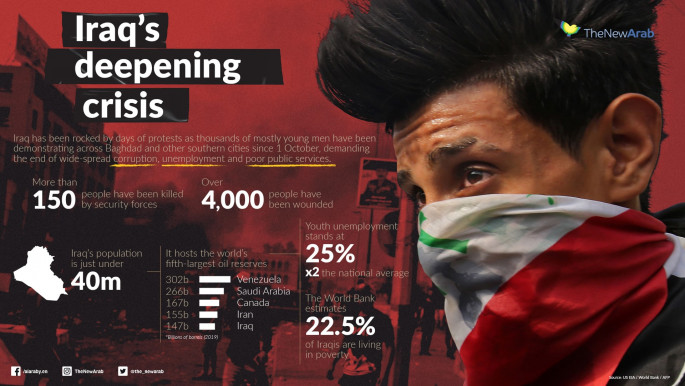Iraqis hold largest protests yet in defiance of violent security crackdown
The square and the wide boulevards leading into it were packed with flag-waving protesters, as security forces reinforced barricades on two bridges leading to the heavily-fortified Green Zone, the seat of government.
The protesters want sweeping change to the political system established after the 2003 US-led invasion, which they blame for widespread corruption, high unemployment and poor public services.
At least 255 people have been killed in two major waves of protests in the past month, including five who died Friday of wounds sustained earlier, according to security and medical officials who spoke on condition of anonymity because they are not authorised to brief reporters.
At least 350 people were wounded Friday as security forces fired tear gas grenades and rubber bullets to drive people back from the bridges.
 |
|
| [Click to enlarge] |
Videos circulated online of a group of protesters holding a poster showing Iran's Supreme Leader Ayatollah Ali Khamenei and the head of its elite Quds force, Gen. Qassim Soleimani, with their faces crossed out.
The video, which showed protesters beating the poster with their shoes, appeared to have been filmed Thursday in Tahrir Square. On Friday, protesters marched over an Iranian flag painted on the pavement with a swastika added to it.
"I was born to be respected, among people who should be respected," said a protester who identified himself as Abu Sajad. "But as far as we are concerned, we have the worst passport in the world and the worst nationality. We are the No. 1 country when it comes to corruption. We have the second or fourth largest oil reserves but we are a poor nation."
Read more: Amnesty calls on Iraq to stop using new tear gas grenades which kill protesters
"This is a great revolution," said Marwa Ahmed, one of several women in the rally. "We will not give up or back down until our demands are met."
This month's protests in Iraq and similar demonstrations in Lebanon are fuelled by local grievances and mainly directed at the political elite, but they also pose a challenge to Iran, which closely backs both governments. An increasingly violent crackdown in Iraq has raised fears of a backlash by Iran and its heavily armed local allies.
On Friday, a group of about 50 militia supporters showed up at the protest, prompting other demonstrators to chant: "Iran take your hands off, the people don't want you!"
Amnesty International says security forces in Baghdad have fired military-grade tear gas grenades directly into the crowds, causing horrific wounds and occasionally lodging the projectiles in people's skulls. During an earlier wave of demonstrations, snipers shot protesters in the head and chest, with nearly 150 killed in less than a week.
The protesters have called for the resignation of the government and sweeping changes to the political system established after the US invasion, which apportions power among the Shia majority and Sunnis and Kurds.
Agencies contributed to this report.
Follow us on Twitter: @The_NewArab



